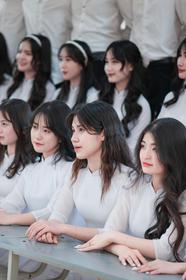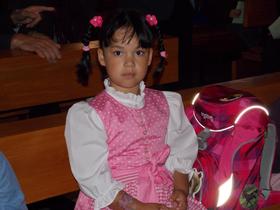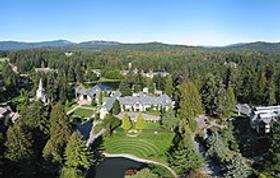Read more details about The Putney School on their 2025-26 profile page.
Reflections and Advice:
1.) What do you think makes your school unique relative to other boarding schools?
Putney is SO unique for a host of reasons, such as its small size, strong arts program, "project week" (which I will describe later), and its funky, spirited, and diverse student body. But its most characteristic features, perhaps, are the work program and the consequent sense of community, which is unrivaled among most other boarding schools. Students are required to participate in daily jobs, which range from washing the school's dishes, to milking cows at 6 am, to vacuuming classrooms. As a result, among work crews, bonds form between students, staff, and faculty that would otherwise be absent. The work program helps to foster--in most students--a respect for manual labor and an ability to engage in, quite simply, hard work. The resulting sense of ownership in the school is one of the most remarkable aspects of Putney.
2.) What was the best thing that happened to you in boarding school?
Putney allowed me to grow and develop in the direction most natural—and thus most right—for me. It helped me to better “know” myself. And I have to believe that only an education as broad as Putney’s could have so fully enabled this. I explored interests and loves in an open and creative environment. Putney allows (and requires) students to taste many of the fruits and rewards of life, and thus gives them a moderately dependable lens through which they can view the world. In a small but certain way, it filled me with a confidence and self-understanding that I will carry with me through my life.
3.) What might you have done differently during your boarding school experience?
My love for Putney grew with each year, and as it did, I became increasingly engaged in the goings-on of the school. I had a wonderful experience at Putney, but the one (perhaps impossible) thing I would have done differently is to have entered Putney as a freshman with the knowledge of just how incredible it can be.
4.) What did you like most about your school?
What did I like most? I can’t come up with just one aspect of Putney, so let me list some memories instead: skiing after a fresh snowfall; performing a Beatles cover with the jazz combo; milking cows at 6 am; reading Hamlet for a senior elective, and then watching its captivating performance by my talented peers; swimming with friends in the puddle (our little swimming pond) on a hot May day; eating cider donuts and drinking fresh cider at the orchard down the hill; discussing Dostoyevsky one-on-one with my senior tutorial faculty advisor… I could fill three pages going on like this. I loved the school.
5.) Do you have any final words of wisdom for visiting or incoming students to your school?
Ski, in the woods.
Academics:
1.) Describe the academics at your school - what did you like most about it?
Though the school is now engaged in a serious discussion about changing the curriculum (to define and incorporate, perhaps, more goals of progressive education) I’ll nonetheless discuss my own experience, many features of which will undoubtedly remain after the change. At Putney, class sizes were small, ranging for me from four students (Spanish Literature 1) to fifteen (Physics, Shakespeare). All of the Humanities classes included much classroom discussion and it was not uncommon to have a teacher who also led your afternoon work activity or who shared your dinner table, for example. Competition was non-existent. Students received grades, though they were not allowed to see them until the second semester of junior year, when college fever traditionally begins. Theoretically, this mechanism encouraged students to learn for the sake of learning while abstaining from grade obsession. And though this goal was, I think, more or less realized, numerous students still disliked the obvious, if mostly harmless, hypocrisy of this system. Instead of final exams, every student participated in “project week.” This consisted of engagement in two individual or group projects over the course of ten days. The best part of the curriculum, particularly impressive for a secondary school, was the opportunities presented to upperclassmen for independent study. I did two senior tutorials (semester long independent studies) and spent my last two months at Putney engaged in a senior exhibition. Senior exhibitions allow graduating seniors to devote a large portion of their academic time to one final culminating project. Projects my year ranged from an intensive molecular biology study, to a thirty foot mural of an alligator, to the recording and production of a folk album.
Athletics:
1.) Describe the athletics at your school - what did you like most about it?
For a school of its size, athletics at Putney are fairly strong. Soccer, basketball, and lacrosse teams sometimes have winning seasons due to the undeniable hard work of the athletes, who have much more on their plate than most other high school athletes. The cross-country skiing and rowing teams can be particularly successful, and often produce athletes who compete at the collegiate level and beyond. There are also horseback riding, biking, rock climbing and alpine skiing groups (and others which I’m doubtlessly forgetting). There are no tryouts for any team.
Art, Music, and Theatre:
1.) Describe the arts program at your school - what did you like most about it?
The entire arts program at Putney is very strong. Though it is not exactly an “art school,” walking through campus one quickly notices the undeniable appreciation for art, and the talent--thus attracted to the school--that resides therein. Beautiful student artwork lines the halls of every building and, beyond typical academic art classes, students are involved in weekly evening activities such as printmaking, blacksmithing, jewelry making, blues jam, hip-hop dance, etc. Once a week the school gathers for half an hour of community singing, dance performances are regularly presented to a full house, biannual theater productions are a highlight of many students’ year, and jazz, rock, or classical music can be heard all day in the performing arts center. The best part of the arts program for me, as a serious musician, was the opportunity to take jazz combo as an academic class for all four of my years. The amount of creative talent and energy at Putney is truly remarkable and is one of its defining aspects.
Extracurricular Opportunities:
1.) Describe the extracurriculars offered at your school - what did you like most about it?
Putney’s website states that the schools eschews the word “extra-curricular,” because the curriculum encompasses all activities and events. I think this an exaggeration, though not a huge one. The mandatory (every term) afternoon, evening, and work programs all take up an enormous amount of students’ time and go a long way in defining the Putney experience. These programs were a major source of enjoyment for me.
Dorm Life:
1.) Describe the dorm life in your school - what did you like most about it?
As a former day student, I can’t write with much authority on dorm life, though I will say that the dorms’ small size lends to a sense of shared responsibility and community. Additionally, ten rising seniors are selected annually to live in pairs in five cabins, which are scattered across the campus (and campus woods). The opportunity to live in a cabin is nothing short of fantastic, and all my cabin-dwelling friends cherished it (along with the hard work it entailed).
Dining:
1.) Describe the dining arrangements at your school.
All community members (including many faculty and staff) dine in the same quirky, beautiful old dining hall. The food is mostly good, and includes a fair amount of milk, eggs, fresh produce, etc. from the farm. Additionally, four nights a week the community sits down to a “family-style” dinner in which diners are served and waited on by student workers. These provide a much-needed respite from busy, chaotic Putney days and can be a good chance to chat with faculty members and their families.
Social and Town Life:
1.) Describe the school's town and surrounding area.
A couple miles down the hill from the school sits the quirky, bucolic town of Putney (population 2,600!). A pizza-joint; a good, little food co-op (great for buying mangos, sandwiches, and other wholesome, organic food); a rib-shack; a diner; a used clothing store… what else could you need? For those city slickers not convinced by Putney’s simple, Vermont diffidence, there are weekly trips to the nearby metropolis of Brattleboro. This small city—big town, really—offers a bit more in the way of music stores, movie theaters, and other necessary teen diversions. But the school’s real attraction, in my mind, is the natural beauty in which it rests. Hundreds of acres of woods and pastures, views of near and distant hills, ski mountains, swimming holes and the Connecticut River. And the foliage, the trees majestic, aflame in the fall…
2.) Describe the social life at your school - what did you like most about it?
Inevitably, by winter break, everyone at Putney knows everyone else. And though there are some predictable downsides to this fact, on a whole I’d judge it as a good thing. Walking through campus and recognizing every face—and stopping to have conversations with every other person—gives one the undeniable feeling of community and, for many (most, I’d say), the feeling of being home. Though there are certainly different social circles, and though Putney is far far far from being a perfect, happy family, this familiarity lends a wonderful informality and comfort to the social atmosphere. Students have their friends but, by virtue of their attending the same, wacky school, generally view everyone else with a spirit of camaraderie. At Putney, it felt at times as though I was living within some joyful, inexpressible secret.
Daily Schedule:
Weekday
1:00 AM
Since my time at Putney, the schedule has been drastically changed.
Weekend
1:00 AM
Since my time at Putney, the schedule has been drastically changed.
Read more details about The Putney School on their 2025-26 profile page.
Alumni Reviews Review School
Review
Description
Putney's core curriculum makes it a leader in the field of progressive education. Because most students live at the school, that means they are steeped in this from the time they get up in the. . .
In addition to a progressive education, two of the most unique aspects of Putney are the work program and arts program. The work program has students working in the kitchen, on the farm, and in. . .
Putney is a vibrant community where teachers and students are actual friends. It’s conducive to personal growth and a place where I and other students found our passions. Everyone is excited and working on something. . .
Show more reviews (13 reviews)
Recent Articles

Types of Boarding Schools (2025 Updated Guide)
Explore key types of boarding schools in 2025 with updated tuition, trends, and expert insights to guide families in choosing the right fit.

Career Pathways Through Boarding School Programs
Explore how Career Pathways Through Boarding School shape internships, mentorships, and long-term success for today’s students.

Boarding vs Day School: Which Is the Better Investment?
Boarding vs Day School costs, value, outcomes, and ROI explained for families weighing today’s educational investment.





